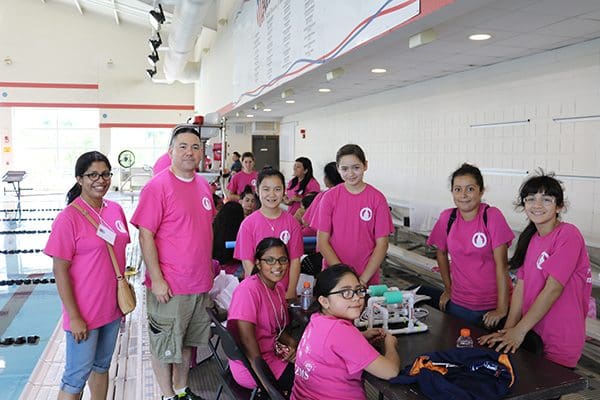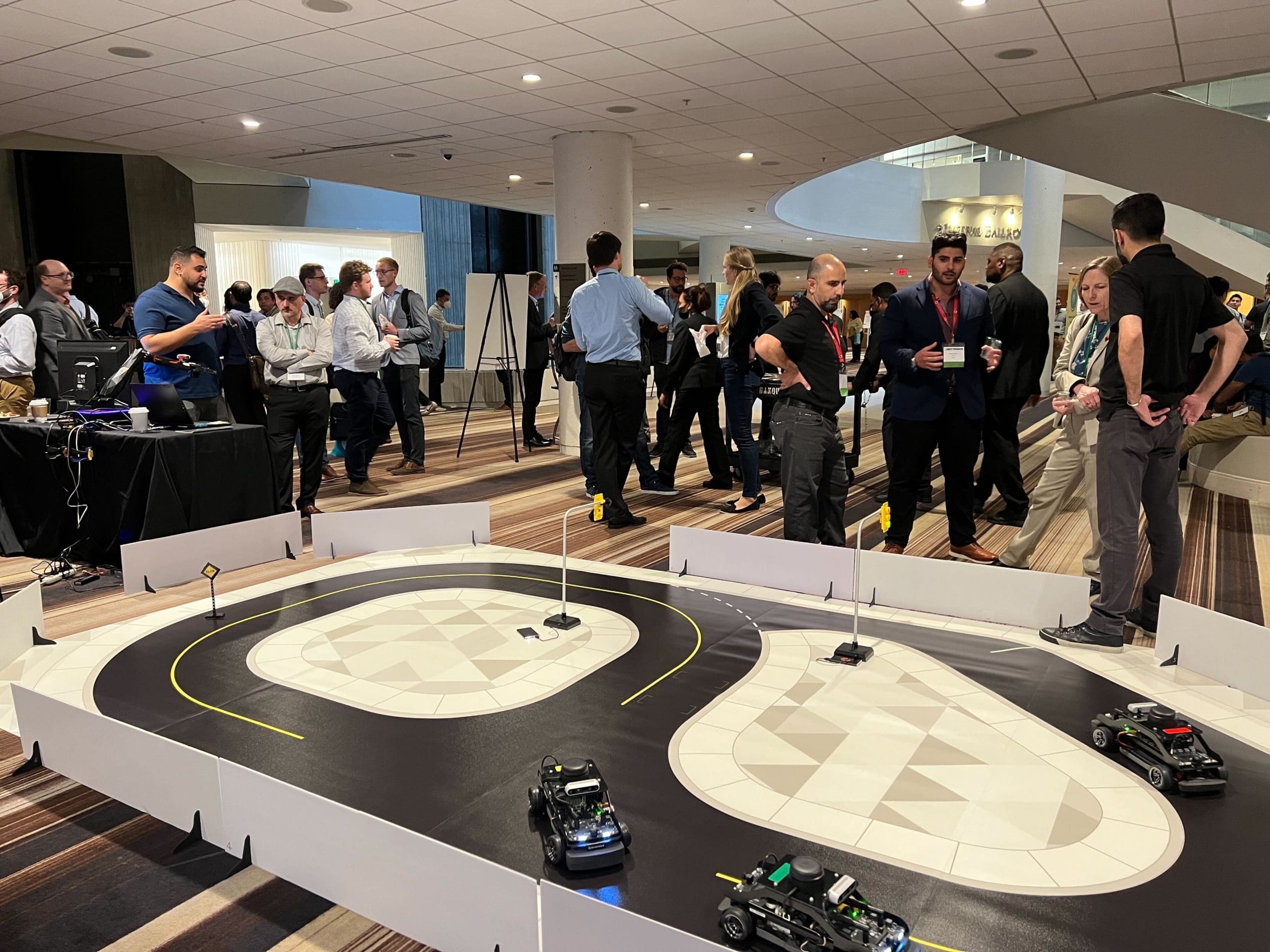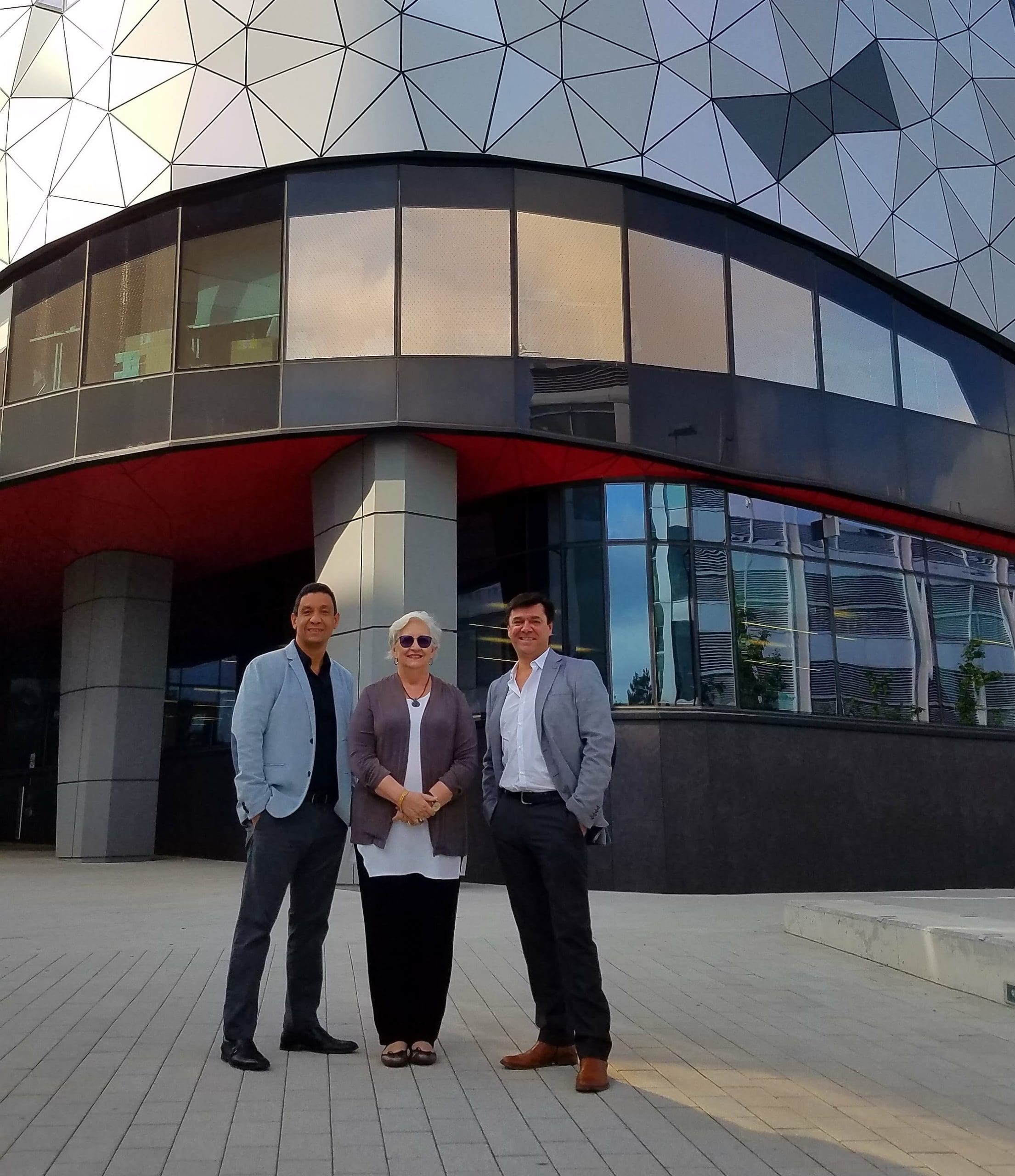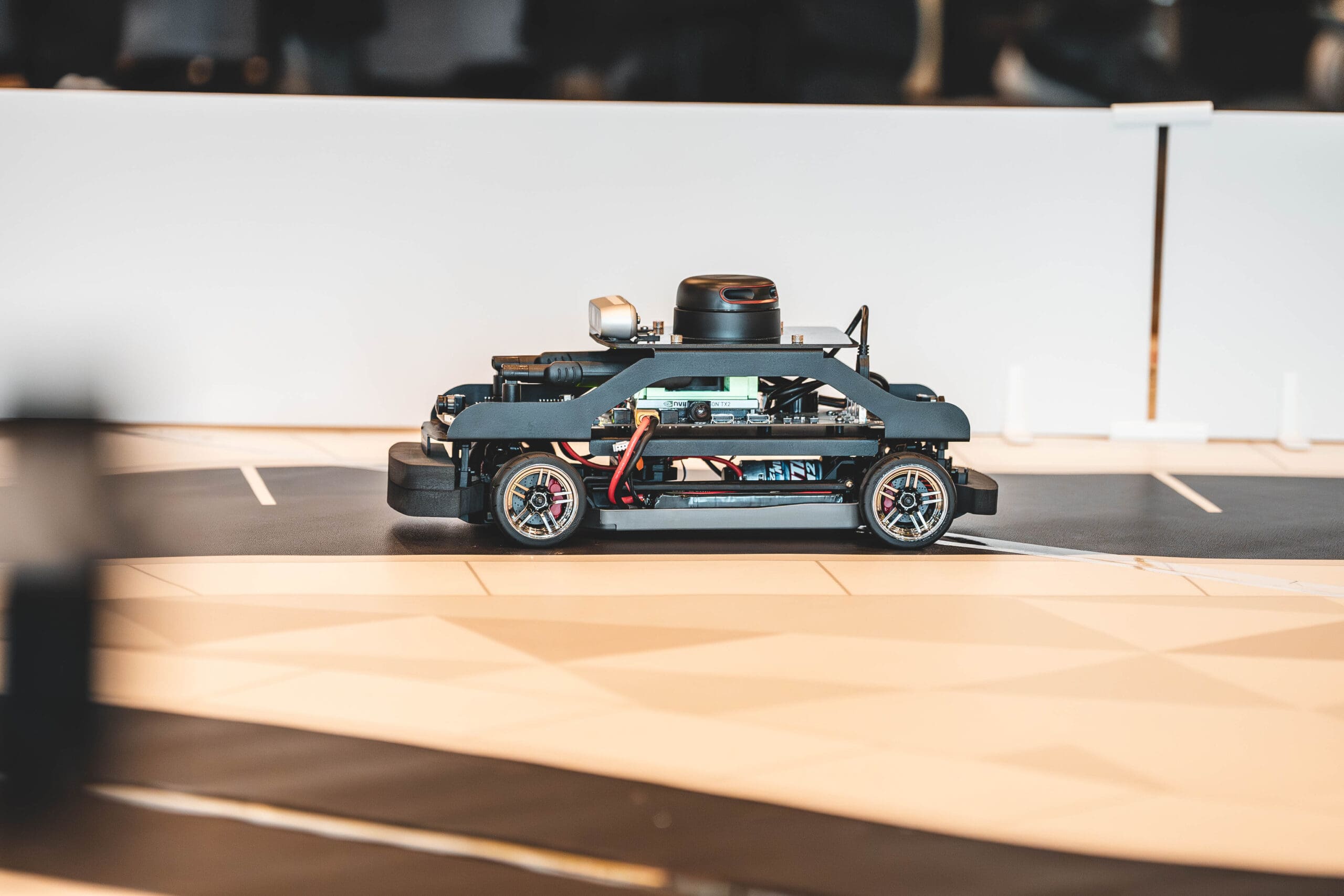
The 2024 American Control Conference in Toronto was the stage for a remarkable display of innovation and engineering prowess as the Quanser Self-Driving Car Student Competition unfolded at the Westin Harbour Castle Hotel. This event was not just a competition; it was a convergence of young minds set to redefine the capabilities of autonomous vehicles.
The Road from Digital Twin to Grand Stage
The Quanser Self-Driving Car Student Competition began with an impressive roster of 39 teams from 28 universities worldwide, all eager to showcase their skills in autonomous vehicle technology. The competition’s initial phase saw a flurry of activity as teams from diverse academic backgrounds used QLabs Virtual QCar, the Digital Twin of Quanser’s Self-Driving Car Studio, to submit their conceptual plan based on the given tasks. The virtual QCar and its environment were a fully instrumented, dynamically accurate digital twin of the physical QCar and on-site environment. The top 11 teams that emerged from this stage were those that successfully overcame the controls and autonomy challenges presented to them on the virtual platform.
As the competition progressed, the field narrowed down to 11 teams that distinguished themselves through their successful algorithm validation on the virtual platform. These teams were poised to bring their theory to life on the grand stage in Toronto.
From there, the competition moved to the algorithm validation stage, where the teams’ ideas were put to the test on a physical platform, Quanser’s QCar, provided to all the teams. This phase was about proving their algorithms’ viability and refining their designs based on real-world feedback and understanding the nuances of digital Twin versus hardware.
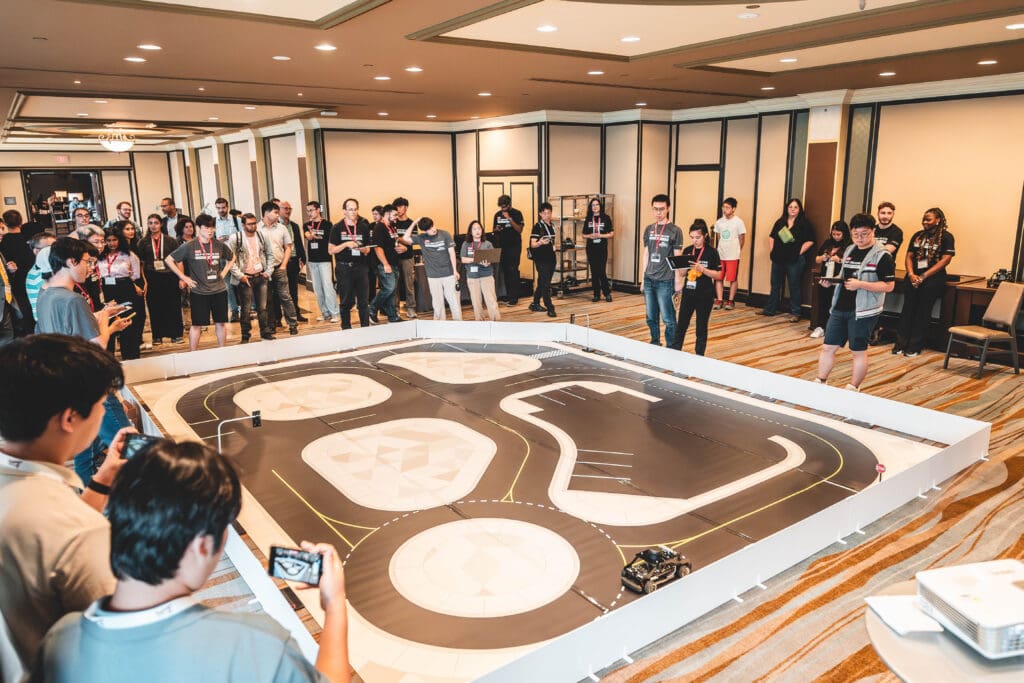
Self-Driving Car Studio (SDCS) map set up at the main competition area
However, the journey to Toronto was not without its hurdles. Due to unforeseeable travel challenges, only eight of the eleven finalists made it to Toronto ready to compete and demonstrate their practical applications of their months of hard work. The absence of the three teams was felt, but the competition moved forward, celebrating the achievements of the teams that were able to make it and honoring the spirit of innovation that all the participants shared.
After months of preparation, the competition culminated in Toronto, where the selected teams had the opportunity to compete on-site at the American Control Conference. Here, the teams faced a series of real-world challenges designed to push the limits of their algorithm and their own skills. These challenges were meticulously planned to test not just the speed but the precision of their autonomous vehicles, demanding flawless real-time decision-making, strict adherence to traffic regulations, and the agility to follow the street profiles. The road from Digital Twin to the grand stage in Toronto was a transformative experience for all participants, marking a significant milestone in their development as future engineers.
The Global Race
The competition saw a diverse array of teams, each bringing their unique perspective to the table (in alphabetical order):
- AutoWheels from King Fahd University of Petroleum and Minerals (Saudi Arabia)
- CalPoly Zoomers from California Polytechnic State University (USA)
- CDSL@UoS from University of Seoul (South Korea)
- Fast&Driverless from Czech Technical University in Prague (Czech Republic)
- FullThrottle-SDCN from York University (Canada)
- PolyCtrl from National Polytechnic University of Armenia (Armenia)
- QCARdinals from University of the Incarnate Word (USA)
- VOICE from Kyungpook National University (South Korea)
The winner was promised rewards that matched the event’s innovative spirit. The faculty supervisor of the winning team was to be awarded a QCar and a one-year subscription to QLabs Virtual QCar, collectively valued at $30,000. Moreover, the champions would also receive a $2,000 Amazon gift card to be shared by the students and the prestigious Golden QCar trophy.
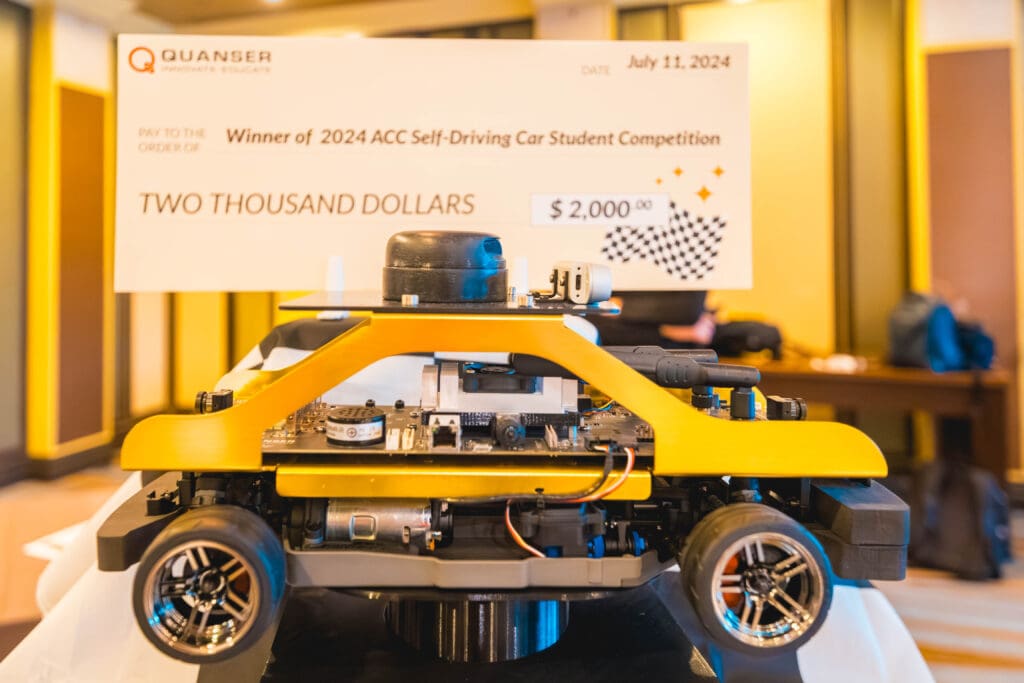
Golden QCar trophy
Transforming Engineering Education Through Competition
The Quanser Self-Driving Car Student Competition stands as a beacon for the transformation of engineering education. It exemplifies how theoretical knowledge can be applied in practical, real-world scenarios, bridging the gap between classroom learning and hands-on experience. This competition is more than just a test of skill; it’s an educational experience that encourages students to think outside the textbook and apply their learning in innovative ways.
By participating in this competition, students gain invaluable experience in teamwork, problem-solving, and project management—skills that are essential for any aspiring engineer. The challenges they face in the competition mirror the complexities they will encounter in their professional careers, preparing them for the future of engineering.

Teams from York University and National Polytechnic University of Armenia competing for the championship
Furthermore, the competition fosters an environment of peer learning, where students can learn from each other’s successes and setbacks. This collaborative atmosphere is crucial for the advancement of engineering education, as it promotes a culture of continuous learning and improvement.
Quanser’s commitment to providing cutting-edge technology for the competition demonstrates the potential for strategic academic partnerships to enhance educational outcomes. By giving students access to the latest technologies, Quanser is not only contributing to their immediate educational experience but also equipping them with the knowledge and tools they need to drive innovation in the field of autonomous vehicles and beyond.
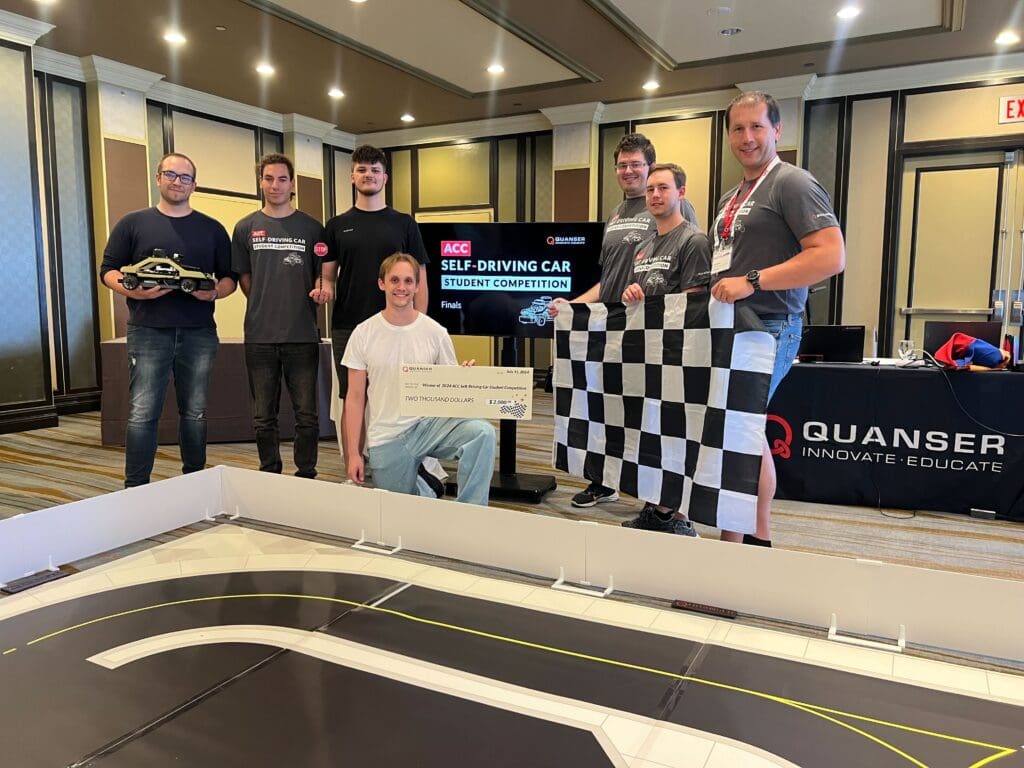
Team Fast & Driverless from Czech Technical University in Prague won the championship
Accelerating the Pace of Autonomous Vehicle Research
The Quanser Self-Driving Car Student Competition has far-reaching implications for the field of autonomous vehicle research. By challenging students to apply their knowledge in a competitive and practical environment, the event serves as a catalyst for innovation in this dynamic field. It provides a unique platform for students to experiment with advanced concepts in sensor fusion, control systems, and real-time decision-making, which are the cornerstones of self-driving technology.
This competition not only propels the students’ projects forward but also contributes to the broader research community’s understanding of autonomous vehicles. The solutions and breakthroughs achieved here can inform and inspire ongoing research projects, potentially leading to advancements in the efficiency, safety, and reliability of self-driving cars. Moreover, the event encourages collaboration between academia and industry, fostering a synergy that is vital for the rapid development of autonomous vehicle technologies.
Quanser’s leading-edge self-driving car technology, showcased during the competition, exemplifies the practical application of theoretical research. It demonstrates how controlled environments and real-world scenarios can merge to test and refine the algorithms that will drive the future of transportation. As a result, the competition not only highlights the current state of self-driving car programs at universities but also sets the stage for future discoveries that will shape the trajectory of autonomous driving.
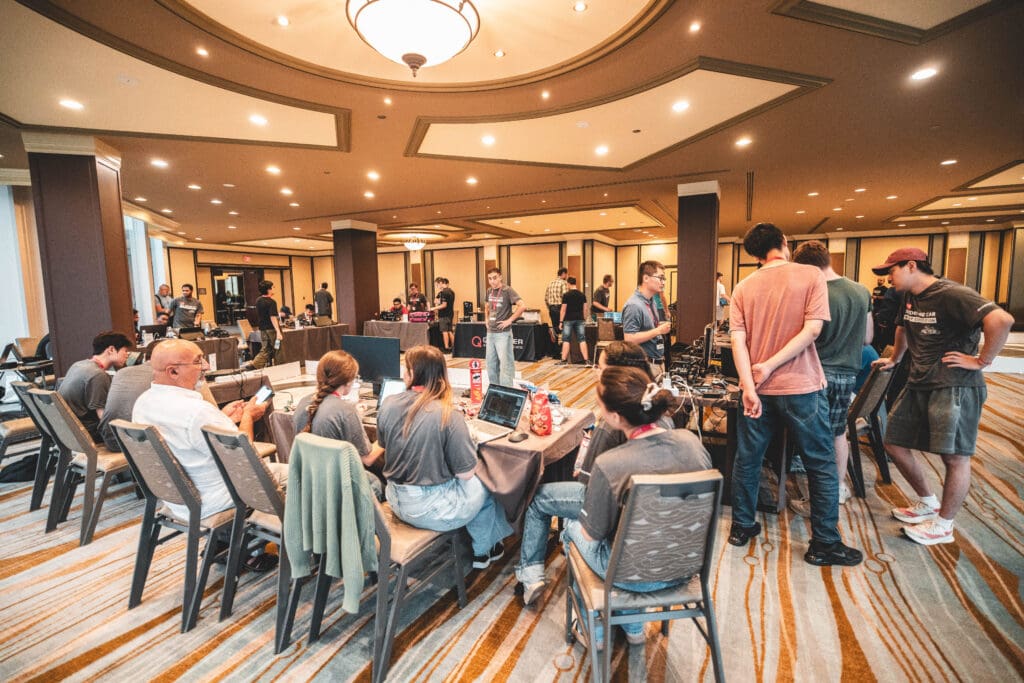
Teams working hard on their codes and testing their algorithm
A Tribute to Quanser’s Dedication and a Look Ahead to ACC 2025
As we reflect on the success of the Quanser Self-Driving Car Student Competition, it’s important to acknowledge the immense effort and dedication of the Quanser team behind the scenes. The seamless integration of cutting-edge technology, meticulous planning, and execution laid the foundation for an event that was as educational as it was exciting. The spirit and atmosphere of the event were captured well in this coverage by the local CTV News.
The Quanser team’s commitment to advancing engineering education and research in Controls, Mechatronics, Robotics, and Autonomy was evident in every detail of the competition. Dr. Jacob Apkarian, Quanser’s founder and CTO, expressed immense pride in fostering the talents of future innovators in this interview. Also, Paul Karam, Quanser’s Chief Robotics Officer and Chief Operating Officer, had a radio interview with 105.9 FM where he shared his thoughts on how the students learned life-changing experiences through the competition and are going to be the future engineers that will make the world a safer place.
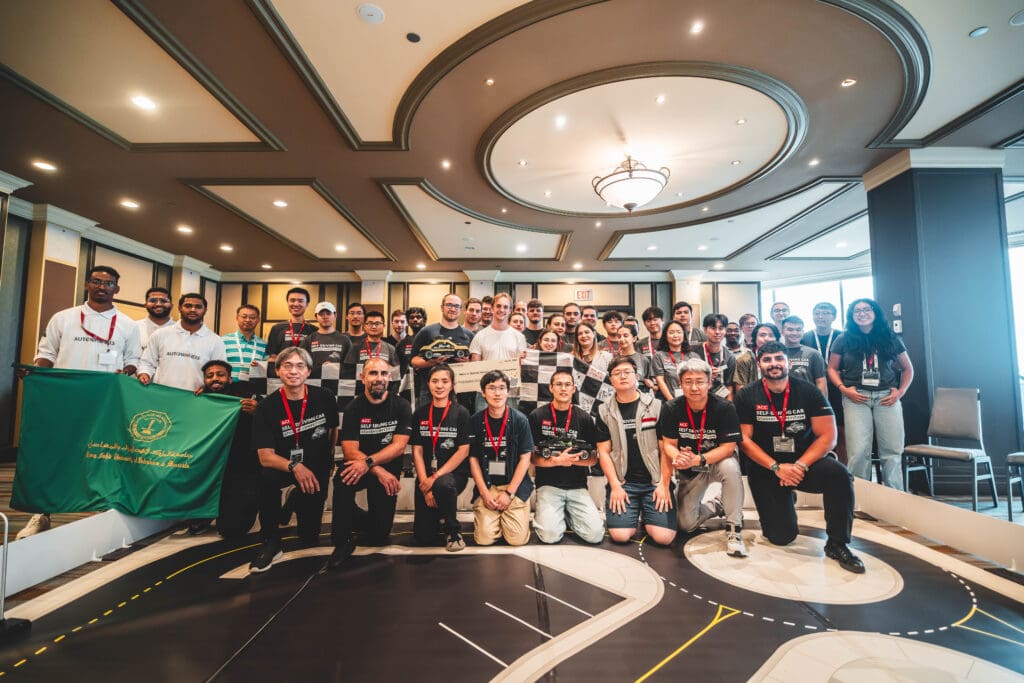
Team Students and Team Quanser
Looking forward, the torch will be passed to the next American Control Conference (ACC 2025) in Denver, Colorado. We invite readers to spread the word and encourage participation in next year’s competition, whether you’re a student with a passion for autonomous vehicles, a university looking to showcase your program’s advancements, or simply an enthusiast of engineering innovation.
So mark your calendars, start your engines, and prepare to join us at ACC 2025 in Denver for another exciting chapter in the journey of self-driving car research and education. Let’s continue to support and celebrate the bright minds that will steer us into a future where autonomous vehicles are not just a possibility, but a reality.
